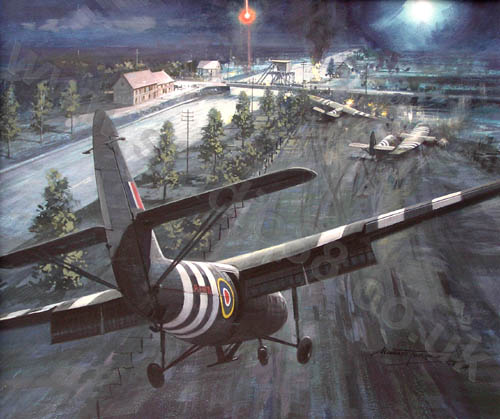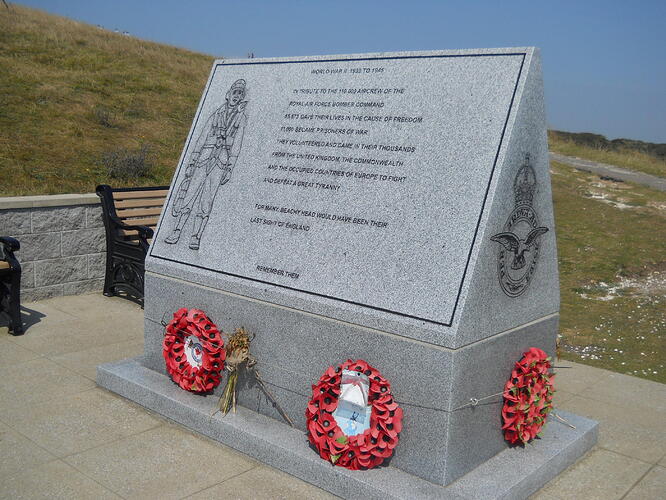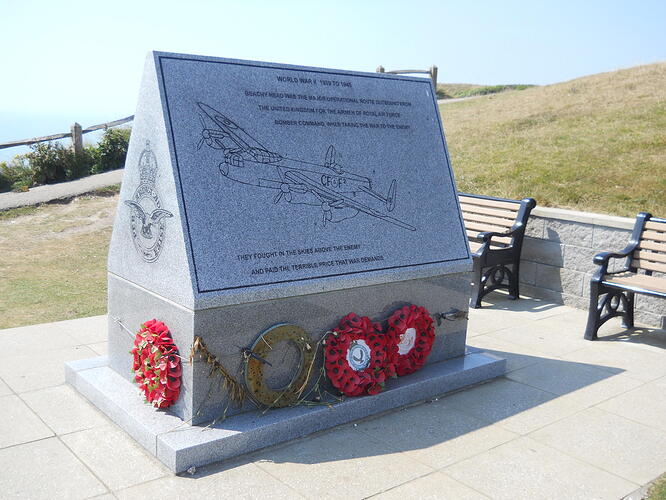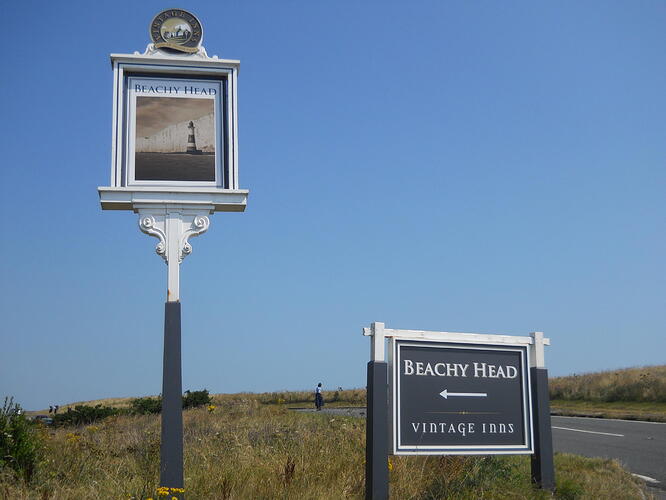I’m sure that you’re right for the most part. Did Goering attempt to win local air superiority? I think that remains a much debated topic. Arguably, the RAF was on the brink when the emphasis was switched to London as a target. There are a lot of assumptions in your statement. Maybe true opinions, but not proven facts. Clearly, the main fact is that they didn’t come. Enjoy!
Nice photos, 32Bravo. I am not familiar with this part of England, a deficiency I must try to correct.
As regards the use of airborne forces to overcome the problems posed for the Germans in exploiting a seaborne invasion across the English Channel, well, I have my doubts. Germany had, in 1940, paratroop and airborne forces of superior quality. However, it is worth examining their performance in the major area of involvement in “Fall Gelb” - the invasion of the Netherlands. The very idea of including the Netherlands in “Fall Gelb” owed much to the Luftwaffe’s interest in obtaining Dutch airfields for use against Britain later. Perhaps in consequence, the allocation of tasks in the Netherlands fell to a great extent on Luftwaffe or Luftwaffe-led forces and commanders. The results could charitably be described as “mixed”.
Leaving aside the multi-arms fiasco that led to the bombing of Rotterdam, an instance of more interest here is the exclusively airborne attack on the area of the Hague. The idea here was that a combined paratroop and airborne (Heer) infantry would launch a surprise attack on airfields around the city (the Netherlands’ administrative capital) and capture the Queen and her government and the Dutch military high command. This, it was hoped, might end the war in the Netherlands or, at least, cripple the Dutch Army’s command structures. The result was, well, a bit of a fiasco. German pilots towing the gliders made pretty much a hash of their navigation. This may have been contributed to by the featureless landscape of the southern Netherlands. To this I can only say that navigational techniques generally regarded as required of group leaders in civilian hillwalking clubs seem to have been absent here. In any event, many targets were missed, with gliders coming down in the wrong areas; other targets were found, but only after delays. As a result, the Dutch defenders were thoroughly alerted. Some of the airport targets were hotly contested, with particular airfields changing hands more than once. By the time the Germans had dealt with this resistance and occupied the Hague, the Queen, her government and the military brass had escaped. The Royal Family and government was eventually evacuated to Great Britain, where they led resistance to the Germans until liberation. The Germans involved in the operation were ordered to strike towards Rotterdam, only to be immobilized and surrounded by the Dutch. They were only rescued from this situation by the general Dutch surrender.
It is worth bearing in mind that this fiasco was played out in the absence of any effective fighter resistance from the Dutch. A similar operation over southern England would have required effective fighter escort, since RAF Fighter Command would have to contended with. Escorting large numbers of Ju52 transports loaded with paratroopers or towing gliders would have been a tricky assignment, not least because the effective operating time of the MeBf 109 over the target area would have been very limited. It is of course speculative, but it seems quite likely that the result would have been a “turkey shoot” for the defending RAF fighters.
The success of the Germans in learning the lessons of the Netherlands was mixed. They do seem to have absorbed, to some extent, the lessons of the one-day battle of Dordrecht (don’t commit large numbers of tanks in cramped urban environment). However, the attack on Crete does not suggest that the lessons regarding the limitations of assaults by paratroop and airborne forces was learned. Best regards, JR.
Unlike Crete in 1941, Britain in 1940 had:
- Single military defence command.
- Unified land, air and naval forces under that command
- Relative to Crete, large, mobile and reasonably well equipped and supplied land, air and naval forces available for sustained resistance to the invader.
- Ability to move those forces to or in support of defending beachhead.
- Ability to retreat in depth over prepared defensive ground while wearing down the invader and extending his somewhat tenuous lines of communication.
- Common language.
- Civilian support in defence of their homeland with all of the above points (although it would be difficult to exceed the brave and determined Greek civilian support given to Commonwealth forces during the battle and, at even greater risk to themselves, after defeat on Crete).
Given somewhat similar problems with Allied gliders landing in Europe in 1944, and despite me having no knowledge of the training and expectations of Allied glider pilots, your comment made me wonder if perhaps there was a notion that glider pilots were one trip expendable pilots who, on both sides, weren’t sufficiently trained to identify their targets and perform the difficult task, which powered pilots weren’t required to do as part of their normal landing, of landing when they ran out of air?
I suspect that glider pilots didn’t get a lot of practice landings on unknown landing grounds with gliders fully laden with troops and or equipment before being sent into action.
Only one airgroup in the UK was fully comitted and egaged by the Luftwaffe during the BoB No 11 Group SE England (Which still held a surplus of pilots and aircraft on each squadrons strength although not as great as other groups squadrons)
No’s 9 Group NW England and NI, 10 Group SW England, 12 Group Midlands and N England, 13 Group N England and Scotland, 14 Group Scotland - were involved to a greater or lesser extent mostly in rotation of Squadrons or Aircrew and dealing with limited German raids (although 12 Group was supposed to cover 11 Groups airfields).
Fighter command was never really in the dire straights it is often portrayed to have been in - much down to films like BoB and propaganda of the time about ‘The Few’ - Fighter Commands strength in aircraft and trained pilots increased during June, July and August while the Luftwaffes actually dropped. The war of attrition was lost by the luftwaffe as they could not sustain their losses - the RAF may not have been able to indefinately suffer the losses but the Luftwaffe reached breaking point first.
Interesting comments, thank you. To what extent had the Luftwaffe reached breaking point when they switched their emphasis to London? Could they have achieved local air superiority at any time? How easily could the northern RAF fighter groups have reinforced, had the southern airfields have been denied them? Did Hitler ever seriously intend to invade Britain? The answers always seem to raise further questions, but I guess that’s a part of the enjoyment. Considering the German successes in Europe and the underestimation of their potential, not least their ability to make good the improbable/impossible, I’m not convinced that the defeat of a German invasion would have been quite so straightforward as some analyses of Sea Lion would suggest.
I think the odds were against German success, largely because the main two preconditions recognised by Germany of naval and air superiority (which were also Allied preconditions to D Day) were not achieved, but also because it seems that German logistics were not up to the task, regardless of whether or not the converted river barge landing craft were adequate to the task. The German success on land in Europe didn’t translate to a massive sea borne invasion, of which (unlike the Allies’ substantial experience by D Day) Germany had no experience in 1940 and never attempted anywhere else subsequently.
Still, there are expert opinions both ways, some of which are summarised at http://www.navalofficer.com.au/sealion/
Yes, I get the D-Day analogy, but not certain that the two are analogous. The German coastal defences in 1944 were far more substantial than anything Britain had in 1940. Arguably, the German success on land in Europe didn’t translate, because they didn’t try it. So I guess it remains a moot point. The reason I queried as to whether Hitler was serious about invading Britain, is that he doesn’t appear to have asked for an alternative plan. Most staff planners present their commanders with options. As we know, the German high command had some very able people, and Hitler could be open to innovative ideas or totally blinkered and inflexible. There are those that argue that the whole invasion exercise was merely a screen to cover the preparations for Barbarossa.
Thanks for the link.
Yeah, the fighter production far exceeded German estimates and Luftwaffe intelligence seems like it was rather poor and vastly over optimistic contributing to an overall demoralization of Luftwaffe crews not suited nor trained for a sustained strategic air war of attrition. The Luftwaffe had also been in near constant action since the Polish campaign and they also knew that Barbarossa was on the horizon as well…
Thank you for that, JR. Very interesting. Force and operation size seems to be a major factor in these airbourne matters. Did you know that later in the war the Germans used parachute troops to invade the Greek island of Leros? The British considered that the Germans might do such a thing, so they dropped a British para to test its plausibility. As the island was very rocky, he broke his leg. From this result they ruled out airbourne invasion. The Germans mounted an airbourne invasion and captured the island.
Yes, the coastal stretch from, say, Beachy Head to Cuckmere Haven, and beyond, is very beautiful. There is a piece of classic film archive of a spitfire crashing in the sea just off Seven Sisters. I saw a recent documentary with the veteran pilot giving his description fo the event.
One of the most beautiful parts of England - almost beats Blackpool! 
Probably not initially and not by design. But eventually more or less I think it became a screen for Barbarossa. Neither the Heer nor Kriegsmarine had much enthusiasm for the project, it was Goering and his intelligence buffoons that were overemphasizing the strengths of a tiring, somewhat depleted Luftwaffe while woefully underestimating the British aerospace industry and the ability of RAF to reconstitute itself. Overall, the German experience of amphibious warfare was not good in WWII with naval infantry being repelled in Westerplatte during the Battle for Poland and The Wehrmacht lacked the institutional experience for large amphibious landings and always regarded the Kriegsmarine as its bastard stepchild.
The Luftwaffe wanted to establish a more strategic bombing capability initially, but the limitations of German industry and the demands of quickly reconstituting an air force from little more than a shadow, covert force precluded the development of expensive four-engined bombers. The Luftwaffe was hastily expanded to deal with relatively peripheral enemies (aka Poland and France) not sustained strategic bombing of distant targets. Its capabilities were also largely mischaracterized and exaggerated by delusional and pompous ****wit named Herman…
Probably not…I wonder? The limitations of German industrial production came so much in to play in many aspects of the European theatre. Too much diversity in too many weapons systems almost certainly because Germany began the war years ahead of schedule and before the capacity for production was increased. Word has it that Germany did not have a war economy when they commenced hostilities even with the Soviet Union.
I think there was sort of a trite belief that by conquering France, Poland and with the final assimilation of Czechoslovakia that the armaments question would take care of itself. The Germans did have a war economy – sort of. But there was a bizarre tendency to attempt to continue the production of consumer goods in an effort to maintain the good graces of the German people and insulate them as much as possible from the abnormalities of war until relatively late - when crises began to escalate and cascade. Most do not realize how agrarian the German economy was at the beginning of WWII. For instance, some will say that German never properly mobilized its female population for war production the way that the United States and Britain did (i.e. no German equivalent to “Rosie the Riveter”). But actually much of the German female adult population was involved in making up for the shortage of male agricultural workers in this period, so in a sense the did mobilize their adult female population for production. The Reich also believed they could make good some shortages via the use of slave labor and captured transport from France. Certainly, the French weapons and trucks went a long way in helping the Wehrmacht until they began to break down or quickly became obsolete and relegated to secondary fronts against partisans. Slave labor was a Catch-22 at best, as many of the best trained machinists were Jews that Germany was trying to work-to-death or kill outright. Starved slave laborers are not very productive and might actually constitute a net loss since you’re feeding them a starvation diet that only allows them to pass out in factories and be unproductive but is enough to draw rations away from more productive German laborers - whom were often demoralized by the brutality of the regime they witnessed with complete disregard for the lives of foreign conscript workers…
In short, I think Hitler believed the easiest way to take Britain was to defeat, or at least severally cripple, the Soviet Union and its government by capturing the most productive areas of industry and agriculture. He would deprive Britain of one of her main hopes and solve the ultimate crisis the Reich faced in terms of access to resources and production shortfalls and limitations - ultimately with an eye towards a total war with the United States and its “Jewish Shadow Government”. Of course the Russians had another idea about that…
British glider pilots were trained and employed as infantrymen once the ship had landed. Navigation and handling were quintessential to the success of the operation. In some operations such as the landings at Syracuse, Operation Huskey, the problems encountered were those such as being shot down by allies or by inexperienced tug-pilots releasing them too soon which resulted in them landing in the sea.
For an example of good glider piloting and towing see the Orne landings (below).

As a bi-product of his war on the Soviet?
Nick - agree with your points. I would go further - the failure of the German government to activate a full war economy was based on political considerations, and was supported by what amounted to extensive looting of occupied territories. Also relevant was a set of rather lazy assumption as to the possibilities for looting further in Soviet territories not yet acquired - and never actually acquired. Thus came about what German historian Gotz Aly characterized as “the accommodating dictatorship”. The German population was shielded from the full rigors of war, at the expense of the occupied populations, and of course of the Jews. One expression of this came in a speech delivered by Hermann Goering in October, 1942 - “If anyone is to go hungry, it will not be a German !”. The defeat at Stalingrad (and related failure of the Caucasus campaign, something under-rated) resulted in a quick transition to “Total War”, as the possibilities for looting suddenly dried up.
Regarding slave labor - indeed a double-edged sword. The Third Reich employed compelled or impressed in a wide range of forms. The advantages are obvious. The disadvantages perhaps less so. These ranged from dependence on workforces under strong compulsion with little incentive to perform their tasks efficiently and effectively to the dislocation of local economies in occupied countries through forced or semi-compelled displacement of local labour forces, to (in the East) the destruction of the productive capacity of regions through the “harvesting” of their workers for employment elsewhere. One point to be borne in mind about the employment of slave labour (and indeed looting) employed on this scale in the modern environment unused to such measures is that it involves a choice, and a complex one at that. This form of direction of labour (and of other productive resources and products), rather than trying one’s best to employ these resources in situ and under minimum compulsion, is likely to be a considerable reduction in the overall efficiency and effectiveness of the economy. There is ample evidence of this in the Third Reich context. Best regards, JR.
The Germans struggled to come up with a really detailed plan - but that is not surprising when the Army wanted a broad front invasion but the Navy wanted a narrow front - fundamentally disagreeing on where to even land - hard to do any plans past that. Saying that though they did persue both plans but in a more half hearted way as it seems the officers nominated to come up with ideas had no illusions as to the ability to actually launch a crossing in any circumstances except the collapse of the British government.
Which begs the question: did Hitler ever really intend to invade the UK?
Simple answer - no - he wanted Britain to surrender or seek peace terms (after all part of the British government did want to seek terms and had spent years appeasing the Germans).
But …
From what I have read (and several years of discussions on various sites and books - including one running to over 10k posts over 7 years) - it was a yes if the issues could be solved (when it became clear early on Britain would continue to fight) - he did not appoint the juniors who did the actual grunt work for the planning (or tried to). He appointed the ‘Names’ and basically said - get it done - those ‘names’ appointed the junior staff officers and units that actually did the planning and the development of equipment to be used.
Those in the higher ranks seemed to be under no illusion in their capability to work together (all arms and forces) and actually cross the channel in force with enough strength to defeat the British, never mind the constant resupply afterwards.
Goering seemed to be the only one convinced that it could be done, while he seemed to ignore the state of his own forces - propoganda hype or winning streak blinding him to facts maybe.
The KM were to block the channel with all available mines at one end (including captured and training mines this amounted to just over 6000 sea mines), the other end was to be covered by shore based artillery - this was supposed to prevent the RN from getting into the channel area.
A slight problem though that at the height of the threat the RN already around 80 destroyers/corvettes/sloops in the Channel ports, to which must be added the armed trawlers and other boats of the ‘Lilliput Navy’ - far outnumbering and outclassing the entire KM fleet even with captured vessals included. The RN did not need to get its larger surface fleet into action.
Even reducing the crews of the KM ships to the bare minimum for their tasks so that the rest could be used to crew the captured and requisitioned ships and boats, they would have to call up just about anyone who had crewed a boat including those who were purely pleasure boat owners - to man all the craft they had.
The KM understood this so were less than enthusiastic about planning it (especially after the losses in Norway - including some spectacular losses in destroyers to outnumbered attackers).
Germany did call up all boat skippers, barges and small craft (over a certain tonnage) even from the lakes in Germany and the occupied zones - it reduced their production capacity due to the disruption to the transportation network. Seems odd to slow down war material production for months just to do something for show.
Hitler did not have a concept of how hard a sea crossing and landing on a hostile shore would be - all their experience was with river crossings (which they assumed could be scaled up), where multiple units could cross with full support from their organic artillery or close air support, using existing bridges/fords or their organic engineer capability - none of which would be present when crossing the channel.




